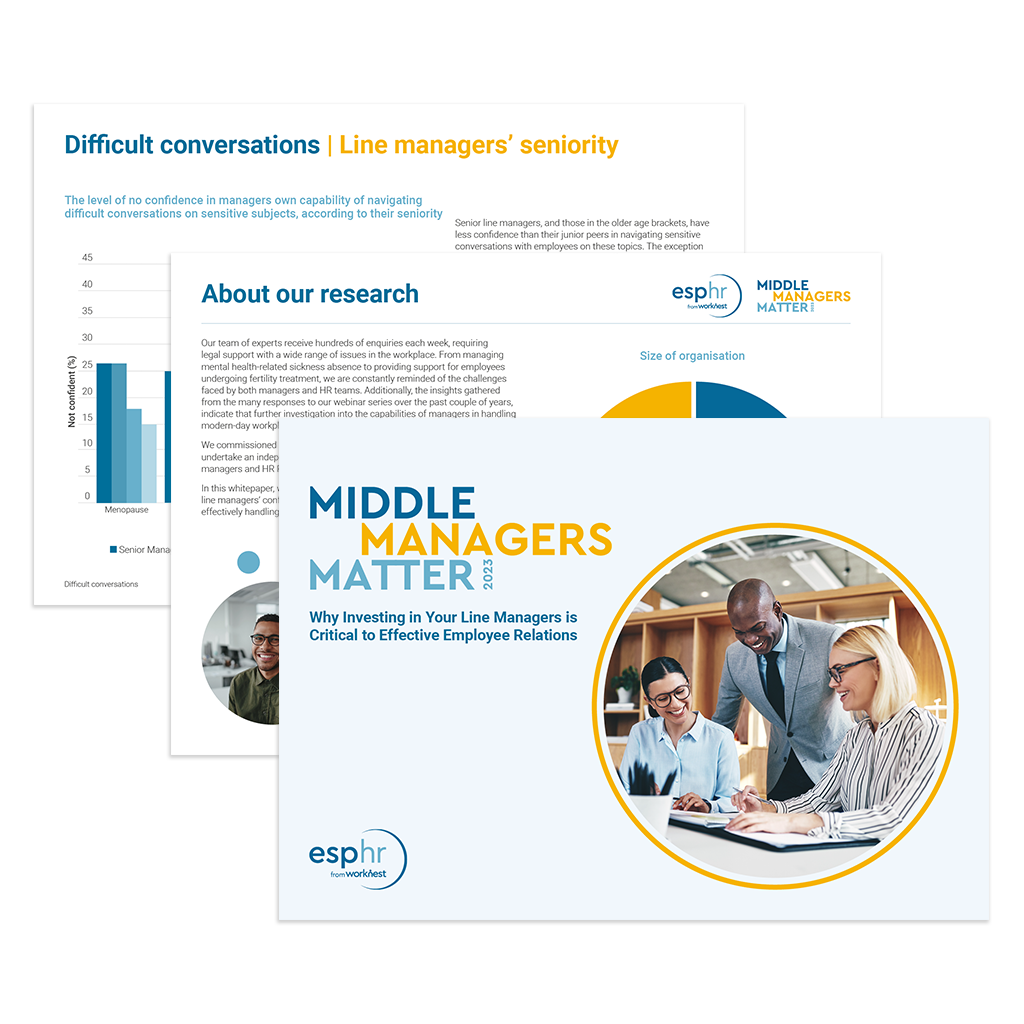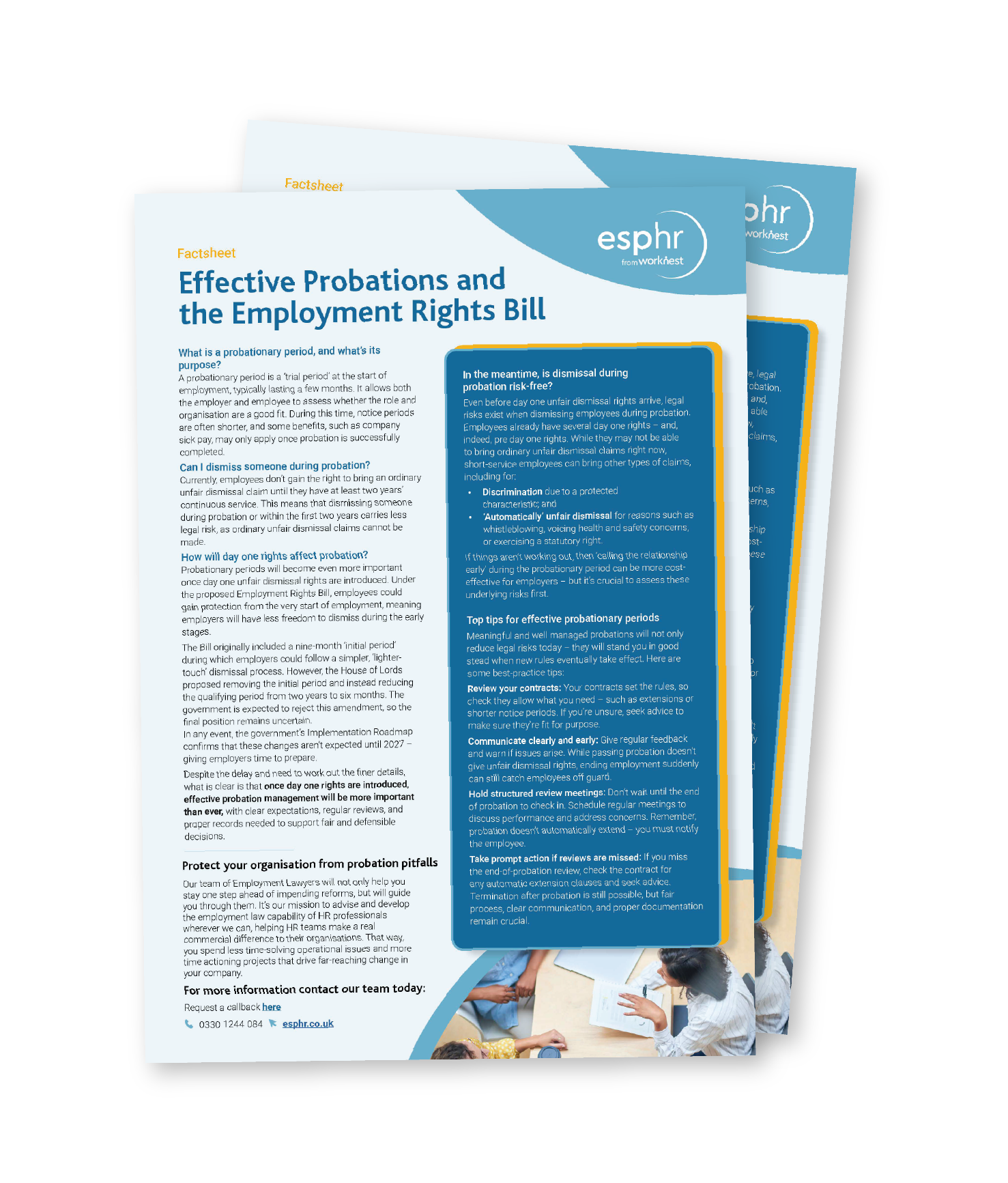Katie Muncaster, Chief People Officer at WorkNest, was recently a panellist on esphr’s webinar held in conjunction with HR Grapevine, titled: Empowering Middle Managers: Insights From Research to Drive Success. The webinar was based on esphr’s national research into the people challenges faced by line managers and their confidence to support on a wide range of employee relation issues – the findings of which have been published in our latest whitepaper. During the discussion, Katie shared her thoughts on some of the themes that emerged from the research, drawing upon her experience as a highly experienced HR professional with a career spanning two decades across a range of industries. Here, Katie sums up her key takeaways from this insightful discussion.
In your experience, what are some common challenges faced by line managers when it comes to discussing and supporting employees on sensitive subjects such as menopause, fertility, and neurodiversity?
Some managers grapple with the belief that they must have all the answers when presented with situations by team members, and this can hinder productive conversations. However, this shouldn’t be the case. It’s impossible to make managers experts on all of these topics, and how each situation presents in a team will differ. So, it’s important to encourage managers to embrace uncertainty and acknowledge and share the fact that they may not have the immediate answer, but they will go away and figure it out with the support of HR and through discussions with the affected colleague. One of the most powerful responses that a leader can give is to communicate, that they don’t have all the answers, but they’re committed to engaging with the individual and listening to their needs and working through the solutions together. This can be a very important part of the process.
One of the challenges in modern-day working stems significantly from the hybrid working approach. While we all appreciate the substantial benefits it brings, managers are no longer working alongside their teams every day, getting to know the details of their lives through casual conversations and shared experiences.
Questions like ‘How are you?’ and ‘How’s everything going?’ have become even more crucial. With the reduction in face-to-face interactions and team-focused discussions due to remote work, the time we invest in understanding our teams’ individual lives and how these impact their work has also dwindled.
Because of this shift to remote work, it’s essential to incorporate these discussions into managers’ schedules. There needs to be a recognition that such conversations should be a part of their daily routine. It’s become quite effortless for daily tasks to overshadow these crucial discussions, potentially causing us to miss out on valuable opportunities to offer support and acknowledge the uniqueness of each individual.
Are there any specific best practices or models that organisations can adopt to build and enhance line manager skills in employee relations?
Yes, certainly. I believe it all begins at the top. It’s about ensuring a culture of open and transparent communication within the business. This culture should be inclusive and celebratory of diversity, ensuring that these important topics are regularly discussed. This helps create a consistent drumbeat, ensuring that these conversations are an ongoing part of our business dialogue.
I firmly believe that practical development opportunities make a significant impact. Developmental sessions focused on role-playing and exploring these conversations with individuals, certainly raise awareness and enhances people’s understanding of these topics, but also empower our managers to have the confidence to discuss and lead on these difficult conversations.
Confidence is also crucial here. Managers should feel capable of having these conversations and it’s okay for them to say, ‘I don’t have all the answers right now, but let’s discuss this together and figure it out.’ Every situation is unique, and each individual’s perspective matters. What works for the employee needs to be explored. This could involve reasonable adjustments or simply communicating, ‘Hey, I’m dealing with this challenge right now.’
There’s a range of ways to approach this, but the key is to foster a culture of open and transparent conversation, a dialogue that permeates throughout the organisation. This needs to be the starting point.
Is it all down to training to help with line managers’ confidence or are there other things that can help with these confidence perceptions?
I think that the relationship between line managers and an HR function is key and must be based on a very trusting relationship which means spending time with each other and understanding ways of working. A line manager should feel that their HR professionals are there to support and guide them through difficult situations. This can be in the physical sense, like attending meetings and taking minutes, as well as providing support through coaching in the background. And I think that goes even further. For HR professionals, ideally, there should be an employment law and support network in place for them, which is exactly the kind of service that esphr provide so brilliantly. I know from first-hand experience that in order for HR to feel confident in supporting their management teams, it’s so important for them to review each case from a legal perspective and there’s an onward effect in that relationship. Of course, training is fundamentally important, but having access to specialist employment guidance, and having someone to talk things through with and maybe offer a slightly different perspective (which I know HR professionals are great at doing), shouldn’t go unnoticed as being truly important as well.
I think an employment law-HR relationship also provides the opportunity to debate how to handle a situation. This reinforces to managers that these things aren’t always defined by some mythical answer they don’t know about. Employment law allows for dealing with situations in different ways in most instances, and it’s all about the individual set of circumstances. So, the fact that there can be a high-quality conversation between a line manager and HR, and ideally their legal support if needed, really shows managers that they’re right to ask questions about sensitive issues and figure out how to do what’s right for the business and employee, while also ensuring they stay compliant with the law.
To watch the webinar in full, click here.





